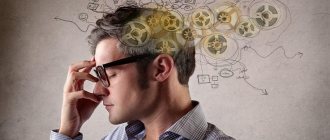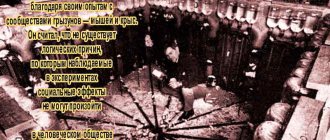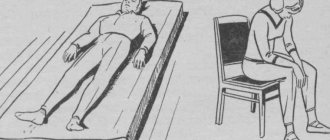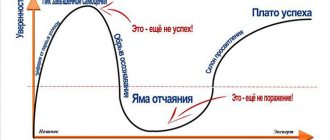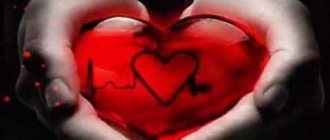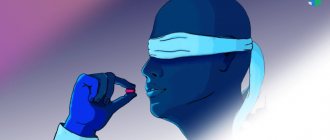Memories and déjà vu: Pixabay Sometimes there is a feeling of repetition of the situation: I have already been here, with these people, in this place. Scientists called the fleeting feeling of recognizing something unfamiliar as déjà vu and are still trying to explain this phenomenon. The features of the phenomenon and its possible causes were explained by psychologists Veronika Nurkova and Anne Cleary.
What is deja vu?
Déjà vu is a short-term state in which current circumstances are perceived as having already happened in the past , but it is not possible to reliably remember when and under what circumstances this happened.
From the sound of the word it is not difficult to guess that it is of French origin. The original phrase “déjà vu” translates as “already seen.” This is a completely appropriate term, since this is how this unusual psychological phenomenon most often manifests itself. But other options are also possible.
Déjà vu can be triggered by a taste or smell, a familiar melody, or tactile sensations. In a completely new situation, there is a strong feeling that this has already happened. Usually the feeling is strong and believable, but a person cannot describe it, so he only screams “Deja vu!”
The original term “Déjà vu” was introduced by the French psychologist Emile Boirac in his 1876 work “The Future of Psychical Sciences.” Before him, another term was used in psychology - “paramnesia”. Literally, this word can be interpreted as “memories beyond memory.” The term introduced by Boirak turned out to be simple, understandable and accurate, so in the future it became generally accepted.
Literature
- Carson R., Butcher J., Mineka S. Abnormal psychology. St. Petersburg: Peter, 2004. - 1167 pp.;
- Dobrokhotova T.A., Bragina N.N. Functional asymmetry and psychopathology of focal brain lesions. M.: Medicine, 1977. - 359 pp.;
- Adachi N., Koutroumanidis M., Elwes R. D. C. (1999). Interictal 18FDG PET findings in temporal lobe epilepsy with déjà vu. J. Neuropsychiatry Clin. Neurosci. 11, 380–386;
- Sno H. N. and Linszen D. H. (1990). The déjà vu experience: remembrance of things past? Am. J. Psychiatry. 147, 1587–1595;
- Warren-Gash, C. and Zeman, A. (2003). Déjà vu. Pract. Neurol. 3, 106–109;
- Kurgan A.A. The phenomenon of deja vu. St. Petersburg: Dmitry Bulanin, 2010. - 154 p.;
- Korb E., Wilkinson C. L., Delgado R. N., Lovero K. L., Finkbeiner S. (2013). Arc in the nucleus regulates PML-dependent GluA1 transcription and homeostatic plasticity. Nat. Neurosci. 16, 874–883;
- Rybin D.N. Value-semantic determination of the phenomenon of derealization: dis. ...cand. psychol. Sci. - Barnaul, 2005. - 156 p.;
- Brown AS (2003). A review of the déjà vu experience. Psychol. Bull. 129, 394–413;
- Jackson JH and Colman W S (1898). Case of epilepsy with tasting movements and “dreamy state”: very small patch of softening in the left uncinate gyrus. Brain. 21, 580–590;
- Neppe V. M. (1983). The concept of déjà vu. Parapsychology Journal of South Africa. 4, 1–10;
- Karlov V.A. (2007). Mental disorders in epilepsy. Annals of Neurology. 2, 9–16;
- Richardson T. F. and Winokur G. (1967). Déjà vu in psychiatric and neurosurgical patients. Arch. Gen. Psychiatry. 17, 622–625;
- Gloor P., Olivier A., Quesney L.F., Andermann F., Horowitz S. (1982). The role of the limbic system in experiential phenomena of temporal lobe epilepsy. Ann. Neurol. 12 (2), 129–144;
- https://biomolecula.ru#;
- Spatt J. (2002). Déjà vu: possible parahippocampal mechanisms. J. Neuropsychiatry Clin. Neurosci. 14, 6–10;
- Goodale M. A. and Milner A. D. (1992). Separate pathways for perception and action. Trends Neurosci. 15 (1), 20-25..
Causes of deja vu
Despite the prevalence of this phenomenon, there is still no clear understanding of what déjà vu is and how it occurs. However, there are several most popular hypotheses. Let's look at them.
"System failure" in memory
This is the simplest and most logical explanation, especially in the computer era, when everyone knows what a “glitch” or software failure is. Our brain can be thought of as a huge computer with incredible computing capabilities and virtually unlimited memory capacity. We remember everything that happens in our lives, but we remember some things clearly, and others superficially.
A wide variety of information enters long-term memory: visual images, sounds, words and phrases, smells and tastes, tactile sensations. Some memories can be stored for decades without reminding us of themselves. But as soon as, for example, you step your foot into the grass wet from the morning dew, you instantly remember a similar feeling from childhood. And with it comes a whole heap of memories: the singing of birds, the smells of flowers, anxious thoughts about going to school tomorrow...
A similar effect occurs during deja vu. The only difference is that the brain “recognizes” the situation by mistake, therefore, apart from the feeling of “already seen,” no additional memories arise. This is where the “system failure” lies. The brain goes into a special mode in which memories are processed. But since it happened by mistake, I can’t remember anything. The brain realizes that it was mistaken, and the state of déjà vu passes, leaving us bewildered.
Accelerated Perception
In an effort to understand what déjà vu is, an interesting theory was put forward by the American physiologist William Burnham. The bottom line is that perception processes in the brain can accelerate significantly when a person is well rested. Due to this, information of any nature (visual, sound, tactile, taste) can be received and processed twice until the moment of awareness. Having received data in duplicate, the brain comes to the conclusion that one of the duplicates is old memories.
Side effect of “digesting” information
Human memory is quite clearly divided into temporary and permanent. During sleep, a special part of the brain - the hippocampus - processes information received during the day and transfers it from temporary memory to permanent memory. Even completely ignored events can end up in the archive, creating vague and ambiguous images in the memory.
This mode of brain functioning sometimes brings surprises. There are known cases when scientists, who have been struggling for a long time to solve a certain problem, suddenly find the answer in a dream. There is no mysticism in this, it’s just that the brain, systematizing information, finds important connections . Sometimes unnecessary information can get into the archive, and perceiving it as memories, a person experiences a feeling of déjà vu.
Subconscious intuition
Within this version, déjà vu is considered a manifestation of intuition. The subconscious mind calculates options for the development of events “in real time” and sometimes tries to give us a hint, which comes in the form of “déjà vu”. The theory is interesting, but is not popular because it does not explain the emotional intensity of the phenomenon in question.
Layering of similar situations and time displacement
This theory also assumes that the time of events occurring right now is slightly shifted in memory. The brain draws analogies with a certain situation in the past - not similar, but causing similar emotions. However, he does not retrieve it from memory. As a result, a person parallelizes and layers events occurring at the present moment.
New - well forgotten old
There is a hypothesis according to which déjà vu is a memory failure. Short-term memory can store from 5 to 9 elements, ranging from a second to several minutes. All other information that is constantly used is stored in long-term memory. Imagine that you are sitting in a school office at a desk, listening to a teacher’s story. At this time, short-term memory processes all the objects and images seen. Only a certain part of them ends up in long-term memory: for example, the image of a teacher, a podium, a school board. A few years later you find yourself in a university lecture hall. You see the same objects as in the school office: a teacher giving a lecture, a podium. And at this moment, déjà vu occurs - since the stimuli were not objects identical to those previously seen, but the general similarity of the new environment with the one encountered earlier. That is, a global comparison has occurred.
It is the failure of the process of comparing new information received with that already stored in long-term memory that serves as the basis for the occurrence of déjà vu. Scientists called this a “breakdown in the source monitoring system.” There is an assumption that the cause of the failure lies in the disruption of the synthesis of the “memory protein” - Arc ( activity-regulated cytoskeleton - associated protein ). This protein was first characterized in 1995, and defects in its synthesis have since been linked to a number of neurological disorders. Researchers from the University of California (San Francisco) in their article in Nature Neuroscience [7] suggest that Arc acts as the main cellular regulator of memory, modulating synaptic plasticity depending on incoming stimuli and participating in the process of transferring information from short-term memory to long-term memory . If its synthesis or functioning is disrupted, then our brain may make a mistake and mistake something new for what has already been seen.
The scientific explanation for déjà vu
Human psychology has been actively studied for about three hundred years, but the most important discoveries have appeared in recent decades. Today science has the opportunity to study in detail the processes occurring in the brain using an electroencephalograph, tomograph and other modern equipment. These devices make it possible to identify the relationship between psychological phenomena and specific parts of the brain.
According to research, the frontal lobes are responsible for the perception of future time in humans, and the temporal region is responsible for the past. The specialization of different parts of the brain allows a person to unambiguously perceive and correctly interpret the time frame of events. Some conditions (anxiety, worry about the future) can provoke a failure in the perception of time, as a result of which a person begins to perceive current events as something that happened in the past, as a result of which he experiences déjà vu.
Could this be a sign of a disease?
Don't be afraid. Research shows that 97% of all people have experienced the feeling of déjà vu at least once. In a healthy person, this condition occurs quite rarely, a couple of times every few years, and lasts no more than ten seconds. It usually appears during a stressful period for a person or during fatigue. However, there is a second, pathological type of déjà vu, which may be a signal of certain diseases. As a rule, pathological déjà vu is characteristic of people with epilepsy. In such cases, déjà vu can last longer than usual - minutes or, in rare cases, hours. It is also accompanied by a feeling of repetition - that a similar situation has already happened more than once in the past.
- Author: Anastasia Glukhikh
Is it normal to experience déjà vu?
This is a common phenomenon that almost everyone experiences, so with rare manifestations it can be considered the norm. But it should be borne in mind that this phenomenon usually manifests itself in states when the brain is tired, as a result of which a short-term failure occurs. If déjà vu occurs too often and causes anxiety, you should consult a psychotherapist.
If you know that the unusual condition is caused by fatigue, you can use such means of preventing déjà vu as:
- good rest (vacation);
- sound sleep at least 7 hours a day;
- playing sports in the fresh air (without increased stress);
- meditation and other relaxation options;
- rest from intellectual activity.
It is recommended to use the listed funds in combination. A good rest will help you get rid of obsessive worries associated with work. Healthy sleep and outdoor exercise are the most important factors for brain health. Meditation and a break from mental activity will help the brain relax and “reboot” if it is too stressed and fixated on work.
Interesting tests
Literacy test
Assess your literacy level.
Proverb knowledge test
Rate how well you know Russian proverbs.
Sea Life Knowledge Test
Who lives at the bottom of the ocean?
Test for knowledge of Russian history
How well do you know the history of Russia?
